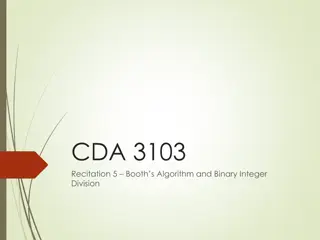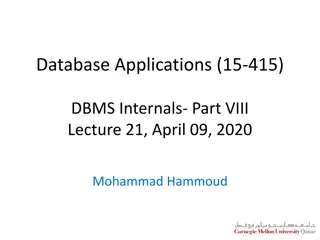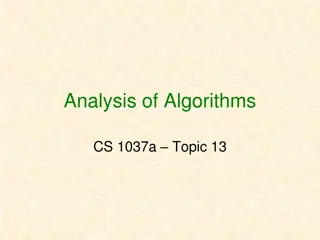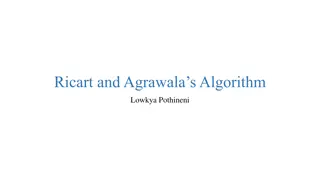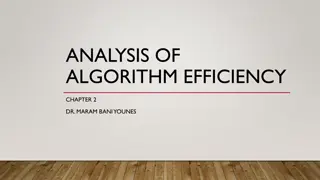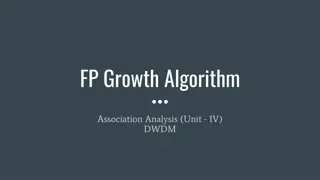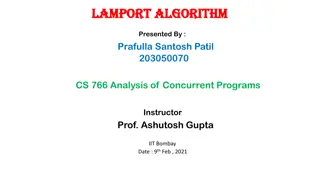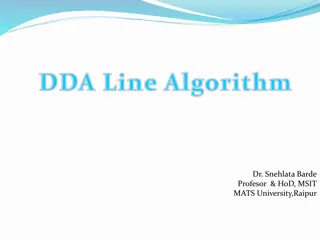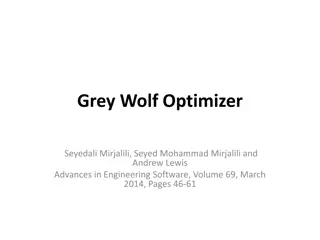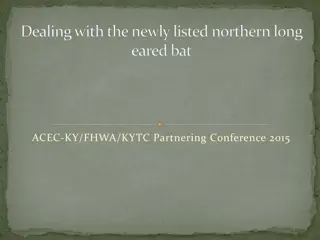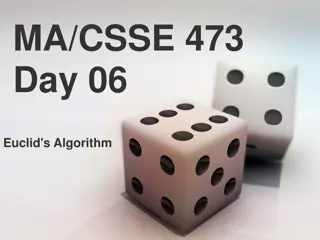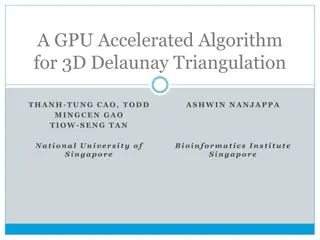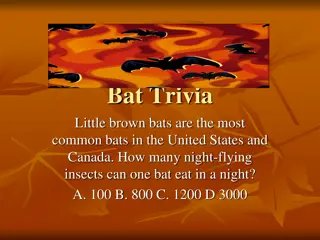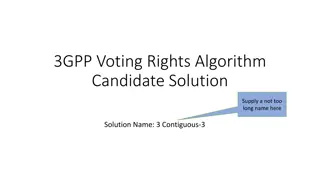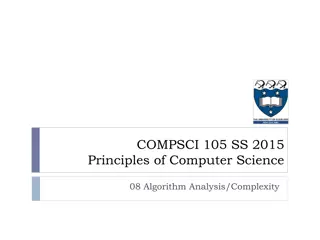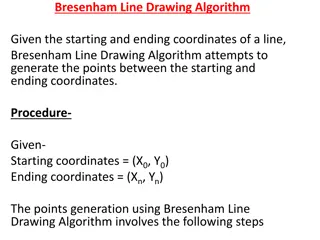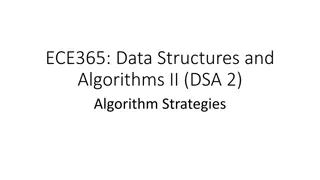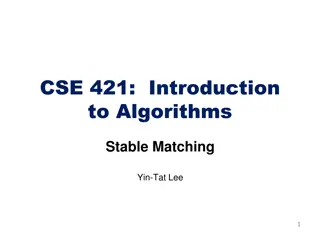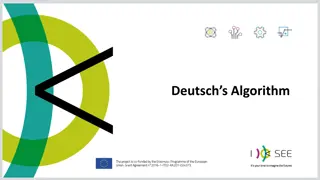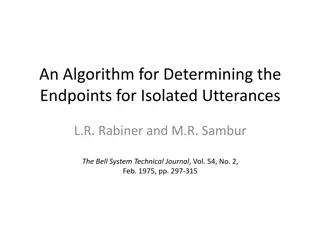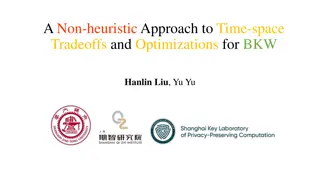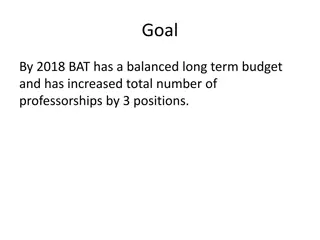Algorithm Analysis
Algorithm analysis involves evaluating the efficiency of algorithms through measures such as time and memory complexity. This analysis helps in comparing different algorithms, understanding how time scales with input size, and predicting performance as input size approaches infinity. Scaling analysi
1 views • 30 slides
Clinical Algorithm for Rash Evaluation
The clinical algorithm outlines the evaluation process for a patient presenting with a rash, focusing on the assessment for measles transmission. It covers key criteria, testing recommendations, and guidelines for suspected measles cases. Healthcare providers can utilize this algorithm to determine
0 views • 5 slides
Advanced Cardiovascular Life Support Algorithm
This advanced cardiovascular life support algorithm provides step-by-step guidance in managing cardiac emergencies such as cardiac arrest, arrhythmias, and other life-threatening conditions. The algorithm includes a series of slides detailing important procedures and interventions to improve patient
5 views • 9 slides
Understanding Booth's Algorithm for Binary Integer Division
Learn about Booth's Algorithm and how it facilitates binary integer division. Discover key points to remember when using the algorithm, steps to initiate the process, and a detailed example to illustrate the multiplication of two operands using Booth's Algorithm.
0 views • 42 slides
Understanding Hash Join Algorithm in Database Management Systems
In this lecture, Mohammad Hammoud explores the Hash Join algorithm, a fundamental concept in DBMS query optimization. The algorithm involves partitioning and probing phases, utilizing hash functions to efficiently join relations based on a common attribute. By understanding the intricacies of Hash J
1 views • 41 slides
Understanding Stable Matchings and the Gale-Shapley Algorithm
The concept of stable matchings is explored, along with the Gale-Shapley algorithm for finding them efficiently. Key ideas and steps of the algorithm are explained, supported by visuals. The process, examples, and observations related to the algorithm's effectiveness are discussed, highlighting the
1 views • 29 slides
Understanding Time Complexity in Algorithm Analysis
Explore the concept of time complexity in algorithm analysis, focusing on the efficiency of algorithms measured in terms of execution time and memory usage. Learn about different complexities such as constant time, linear, logarithmic, and exponential, as well as the importance of time complexity co
0 views • 73 slides
Ricart and Agrawala's Algorithm for Mutual Exclusion
The Ricart-Agrawala Algorithm is a distributed system algorithm for achieving mutual exclusion without the need for release messages, developed by Glenn Ricart and Ashok Agrawala. The algorithm involves processes sending timestamped requests to enter a critical section, with careful handling of repl
1 views • 16 slides
Understanding Algorithm Efficiency Analysis
In this chapter, Dr. Maram Bani Younes delves into the analysis of algorithm efficiency, focusing on aspects such as order of growth, best case scenarios, and empirical analysis of time efficiency. The dimensions of generality, simplicity, time efficiency, and space efficiency are explored, with a d
1 views • 28 slides
Understanding FP-Growth Algorithm for Association Analysis in Data Warehousing and Data Mining
FP-Growth algorithm is a powerful method for discovering frequent itemsets in data sets. It utilizes a compact data structure called an FP-tree to efficiently mine frequent patterns. By encoding data into an FP-tree representation, the algorithm can identify frequent itemsets directly from memory, m
6 views • 20 slides
Understanding Lamport Algorithm for Mutual Exclusion
Lamport Algorithm, presented by Prafulla Santosh Patil, is a permission-based algorithm utilizing timestamps to order critical section requests and resolve conflicts. It employs three types of messages: REQUEST, REPLY, and RELEASE, where each site manages a queue to store requests. By ensuring commu
0 views • 15 slides
Digital Differential Analyzer (DDA) Algorithm in Computer Graphics
In computer graphics, the Digital Differential Analyzer (DDA) Algorithm is utilized as the basic line drawing algorithm. This method involves interpolation of variables between two endpoints to rasterize lines, triangles, and polygons efficiently. The algorithm requires inputting coordinates of two
0 views • 9 slides
Latest Developments in Data Centre FAQ and BAT
The latest draft Data Centre FAQ and BAT provide key updates and additions focusing on topics such as temporary plant usage, commissioning definitions, emissions optimization, waste codes for reporting, and more. Moving towards using SCR as BAT highlights the industry's shift towards larger, more ef
0 views • 10 slides
Little League Rules and Regulations Guidance
This collection provides essential guidelines for Little League participants, emphasizing respect, safety, and compliance with bat regulations. From knowing and respecting the rules to using the correct bat specifications for different age groups, these images highlight key aspects of maintaining th
0 views • 57 slides
Grey Wolf Optimizer: A Nature-Inspired Optimization Algorithm
The Grey Wolf Optimizer algorithm is based on the social hierarchy of grey wolves in the wild. Inspired by the pack behavior of grey wolves, this algorithm utilizes alpha, beta, and delta solutions to guide the optimization process. The hunting phases of tracking, pursuing, and attacking prey mimic
3 views • 16 slides
Emergency Paediatric Tracheostomy Management Algorithm
Emergency Paediatric Tracheostomy Management Algorithm provides a structured approach for managing pediatric patients requiring tracheostomy in emergency situations. The algorithm outlines steps for assessing airway patency, performing suction, and changing the tracheostomy tube if necessary. It emp
0 views • 4 slides
Development of Satellite Passive Microwave Snowfall Detection Algorithm
This study focuses on the development of a satellite passive microwave snowfall detection algorithm, highlighting the challenges in accurately determining snowfall using satellite instruments. The algorithm uses data from AMSU/MHS, ATMS, and SSMIS sensors to generate snowfall rate estimates, overcom
0 views • 20 slides
Exploring the Northern Long-Eared Bat: Habitat, Range, and Conservation Status
Discover the fascinating world of the northern long-eared bat (NLEB) through insights on its range, appearance, habitat preferences, and conservation status. Learn about its roosting habits, distribution across states, and the challenges it faces as a threatened species. Delve into the complexities
0 views • 25 slides
Understanding Euclid's Algorithm: An Ancient Approach to Finding Greatest Common Divisors
Euclid's Algorithm, dating back 2500 years, offers a simpler method to find the greatest common divisor (gcd) of two non-negative integers compared to traditional factorization. By iteratively applying a rule based on the gcd of remainders, it efficiently computes gcd values. The basis of the algori
0 views • 15 slides
GPU Accelerated Algorithm for 3D Delaunay Triangulation
Thanh-Tung Cao, Todd Mingcen Gao, Tiow-Seng Tan, and Ashwin Nanjappa from the National University of Singapore's Bioinformatics Institute present a GPU-accelerated algorithm for 3D Delaunay triangulation. Their work explores the background, related works, algorithm implementation, and results of thi
0 views • 24 slides
The Rodrigues Fruit Bat: A Species in Peril
The Rodrigues fruit bat, an endangered species, lives in trees of rain forests, with black head and wings, orange belly, weighing 10-12 oz, and measuring about 1.52 feet. Their diet includes guavas, bananas, and mangos. With only a couple hundred left, threats like predators and human killings have
0 views • 11 slides
Fun Facts About Bats!
Discover fascinating facts about bats, the only mammals capable of true flight. From their modified hands that form wings to their diverse diets and unique abilities like echolocation, bats are truly remarkable creatures. Find out more interesting bat facts at batweek.org and engage in fun bat activ
0 views • 12 slides
Cuckoo Search: A Nature-Inspired Optimization Algorithm
Cuckoo Search (CS) algorithm, developed in 2009, mimics the brood parasitism of cuckoo species and utilizes Lévy flights for efficient optimization. This algorithm has shown promise in outperforming other traditional methods like PSO and genetic algorithms. The behavior of cuckoos in laying eggs an
0 views • 25 slides
Basophil Activation Test (BAT) in Allergy Diagnosis and Monitoring
Basophil Activation Test (BAT) is a valuable tool in diagnosing and monitoring allergies. It involves taking a structured patient history, confirming allergen identity through objective tests like prick tests or sIgE measurement, and monitoring basophil sensitivity. BAT can be useful in various clin
0 views • 4 slides
Fun Bat Trivia Facts for Nature Enthusiasts
Explore interesting bat trivia, including their feeding habits, historical presence, physical characteristics, and remarkable abilities. Learn about the diverse world of bats and their important role in ecosystems.
0 views • 11 slides
Ford-Fulkerson Algorithm for Maximum Flow in Networks
The Ford-Fulkerson algorithm is used to find the maximum flow in a network by iteratively pushing flow along paths and updating residual capacities until no more augmenting paths are found. This algorithm is crucial for solving flow network problems, such as finding min-cuts and max-flow. By modelin
0 views • 26 slides
3GPP Voting Rights Algorithm: Contiguous-3 Solution Evaluation
This evaluation delves into the advantages and disadvantages of the 3 Contiguous-3 solution within the 3GPP voting rights algorithm. It explores scenarios to test the algorithm's effectiveness in granting and revoking voting rights based on meeting attendance types. The evaluation includes diverse h
0 views • 10 slides
Waste Treatment BAT Conclusions Permit Reviews SEPA Oct/Nov 2022
Introduction to the new Waste Treatment (WT) BREF/BATCs covering key changes, permit review mechanism, completion of BAT Gap Analysis, SEPA WT BATCs Interpretation Document, differences between SEPA and EA approach, and new permit templates. Includes a Q&A session.
0 views • 15 slides
Introduction to Algorithm Analysis and Complexity in Computer Science
Algorithm analysis is crucial in determining the efficiency of programs by analyzing resource usage such as time and space. This involves comparing programs, understanding data structures, and evaluating algorithm performance. Efficiency is key as program execution time depends on various factors be
0 views • 66 slides
Bresenham Line Drawing Algorithm Explained with Examples
Bresenham Line Drawing Algorithm is a method used to generate points between starting and ending coordinates to draw lines efficiently. This algorithm involves calculating parameters, decision parameters, and iteratively finding points along the line. Two example problems are provided with step-by-s
0 views • 8 slides
Algorithm Strategies: Greedy Algorithms and the Coin-changing Problem
This topic delves into general algorithm strategies, focusing on the concept of greedy algorithms where locally optimal choices are made with the hope of finding a globally optimal solution. The discussion includes the nature of greedy algorithms, examples such as Dijkstra's algorithm and Prim's alg
0 views • 91 slides
Go to BAT. Starting and supporting a local broadband action team
Learn about the importance of forming Broadband Action Teams (BATs) to improve broadband access in rural areas. Discover how communities can take charge of their connectivity needs by forming small but impactful groups dedicated to advocating for better broadband services and helping residents make
0 views • 5 slides
Understanding Bar/Bat Mitzvah and Jewish Laws
Explore the significance of Bar/Bat Mitzvah ceremonies in Judaism, the importance of following religious laws, and the responsibilities individuals have towards their faith. Discover how these ceremonies mark the coming of age and the start of personal accountability for Jewish children. Delve into
0 views • 11 slides
Understanding Bar/Bat Mitzvah: A Jewish Coming-of-Age Tradition
Explore the significance of Bar/Bat Mitzvah in Judaism, from its ritualistic nature to the age of responsibility. Discover how this milestone marks a transition to adulthood and learn about unique ceremonies like celebrating at age 80.
1 views • 60 slides
Stable Matching Problem and Gale-Shapley Algorithm Overview
The content provides information on the stable matching problem and the Gale-Shapley algorithm. It covers the definition of stable matching, the workings of the Gale-Shapley algorithm, tips for algorithm implementation, and common questions related to the topic. The content also includes a summary o
0 views • 16 slides
Understanding Deutsch's Algorithm in Quantum Computing
Deutsch's Algorithm is a fundamental quantum algorithm designed to solve the problem of determining if a given function is constant or balanced. This algorithm leverages quantum principles such as superposition and entanglement to provide a more efficient solution compared to classical methods. By e
0 views • 17 slides
Algorithm for Determining Endpoints in Speech Recognition
This article discusses an algorithm proposed by L.R. Rabiner and M.R. Sambur in 1975 for determining endpoints in isolated utterances. The algorithm focuses on detecting word boundaries in speech through the recognition of silence, which can lead to reduced processing load and increased convenience,
0 views • 22 slides
2020 USA Softball Rule Changes
In 2020, USA Softball introduced several rule changes impacting fence distances, bat and softball certifications, helmet specifications, and pitching rules. These changes aim to standardize regulations and enhance player experience across various softball categories. Notable adjustments include exte
0 views • 12 slides
Time-space Tradeoffs and Optimizations in BKW Algorithm
Time-space tradeoffs and optimizations play a crucial role in the BKW algorithm, particularly in scenarios like learning parity with noise (LPN) and BKW algorithm iterations. The non-heuristic approach in addressing these tradeoffs is discussed in relation to the hardness of the LPN problem and the
0 views • 14 slides
Strengthening BAT's Long-Term Budget and Professorship Growth Strategy
BAT aims to achieve a balanced long-term budget by 2018 while increasing the total number of professorships by 3 positions. Through actions focused on maintaining teaching activities, recruiting PhD students, reinforcing research-based education, and prioritizing externally funded activities, BAT pl
0 views • 4 slides



